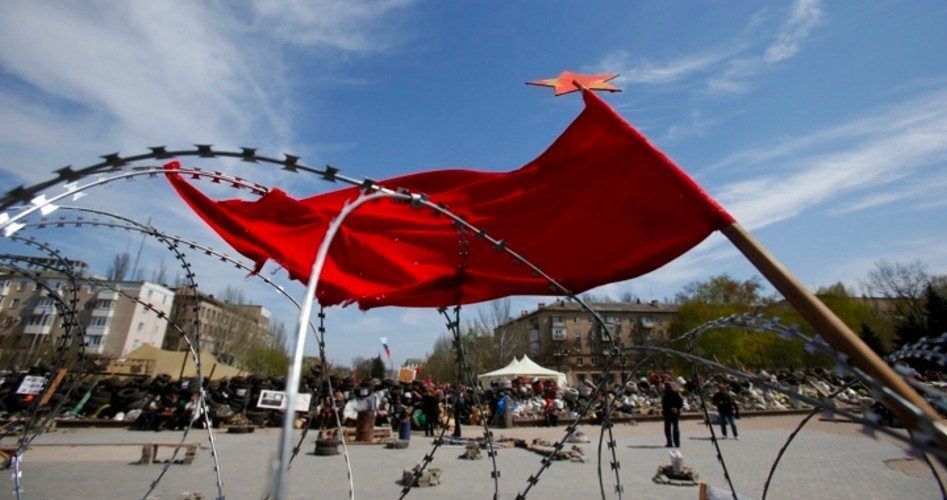
Widespread news accounts of handbills being circulated in the troubled eastern Ukraine province of Donetsk calling for registration of all Jews with a putative separatist government may have been a hoax, according to a report in New Republic magazine.
New Republic’s Julia Ioffe reported, “One local snapped a photo of the fliers and sent it to a friend in Israel, who then took it to the Israeli press and, voila, an international scandal: American Twitter is abuzz with it, Drudge is hawking it, and … in Geneva, U.S. Secretary of State John Kerry slammed the fliers as ‘grotesque.’”
Kerry said in that April 17 press conference,
In year 2014, after all of the miles traveled in all of the journey of history, this is not just intolerable; it’s grotesque, is beyond unacceptable. And any of the people who engage in these kinds of activities, from whatever party or whatever ideology or whatever place they crawl out of, there is no place for that, and unanimously every party today joined in this condemnation of that kind of behavior.
Donetsk is a highly industrialized region of the Ukraine, lying on the easternmost border with Russia. In early April, an uprising of ethnic minority Russians took over some government buildings around the Donetsk oblast (state), an uprising that is ongoing. Al Jazeera reported an April 17 attack by militants against the Ukrainian military base in the Donetsk port town of Mariupol on the Black Sea. No Ukrainian soldiers were hurt, but three of the militants were killed in the melee.
Donetsk also has heavy mining interests, and some observers have speculated that Russian President Vladimir Putin, coveting these interests, may move to absorb Donetsk into Russia, just as Ukraine’s Crimea region was annexed by Russia under a dubious vote and treaty in March. But unlike the Crimea — which was part of Russia until the 1950s and is still populated by a majority of ethnic Russians — Donetsk has a majority of ethnic Ukrainians. Donetsk’s absorption into Russia is unlikely absent an invasion from Russia.
That invasion is not beyond the realm of possibility, however. Foreign military analysts have noted a build-up of forces along the Ukrainian border in recent months, and Putin has refused to forswear an invasion. “I remind you that the Federation Council (the upper house of parliament) granted the president the right to use military force in Ukraine,” Putin said in televised call-in with the nation, according to the Israeli-based Ynet News. “I really hope that I do not have to exercise this right and that we are able to solve all today’s pressing issues via political-diplomatic means.” Putin has labeled Ukraine’s military action against the protesters in Donetsk a “grave crime.” Meanwhile, Ukrainian officials claim to have 10 Russian nationals in custody with “intelligence backgrounds,” implying that the Donetsk troubles were a Russian provocation.
Even though Putin has refused to forswear the military option, President Obama claims not to be considering military assistance to the corrupt Ukrainian state. “I think I’ve been very clear that military options are not on the table in Ukraine because this is not a situation that would be amenable to a clear military solution.” But Obama also added in that April 17 press conference that the United States would “prepare additional responses should Russia fail to take a different course.”
In fact, the menacing posture Russia has taken with regard to Ukraine has already served as impetus for U.S. aid to Ukraine, despite the fact that in Ukraine, as in Russia, the same old oligarchs appear to be in charge.
The Obama statement comes after the U.S. Congress passed a $1-billion bailout package (House vote 378-34, Senate vote 98-2) for Ukraine’s troubled economy at the end of March. The bill, the Economic Stability of Ukraine Act of 2014, also imposed economic sanctions against Russia over the Crimean annexation. The bill would supplement an $18-billion bailout for the failing Ukrainian economy from the IMF earlier this year. According to IMF economic data, Ukraine’s national savings rate has plummeted from a respectable 20.8 percent in 2008 to 6.0 percent in 2012 — almost Greek levels of savings (national savings rates are the best predictor of economic growth). The National Bank of Ukraine raised the discount rate to 9.5 percent from 6.5 percent on April 15 after a spike in monthly inflation of 3.4 percent (almost a 40 percent annualized rate) in March of this year.
But former Congressman Ron Paul voiced the view of many American taxpayers by speaking out against the aid package as unconstitutional and counter-productive: “This $1 billion for Ukraine is a rip-off for the America taxpayer, but it is also a bad deal for Ukrainians. Not a single needy Ukrainian will see a penny of this money, as it will be used to bail out international banks who hold Ukrainian government debt.”
The former congressmen added of the Ukrainian unrest, “If we really cared about democracy we would not have taken either side, as it is none of our business.”
Photo of Red flag in Donetsk: AP Images
Related article:


